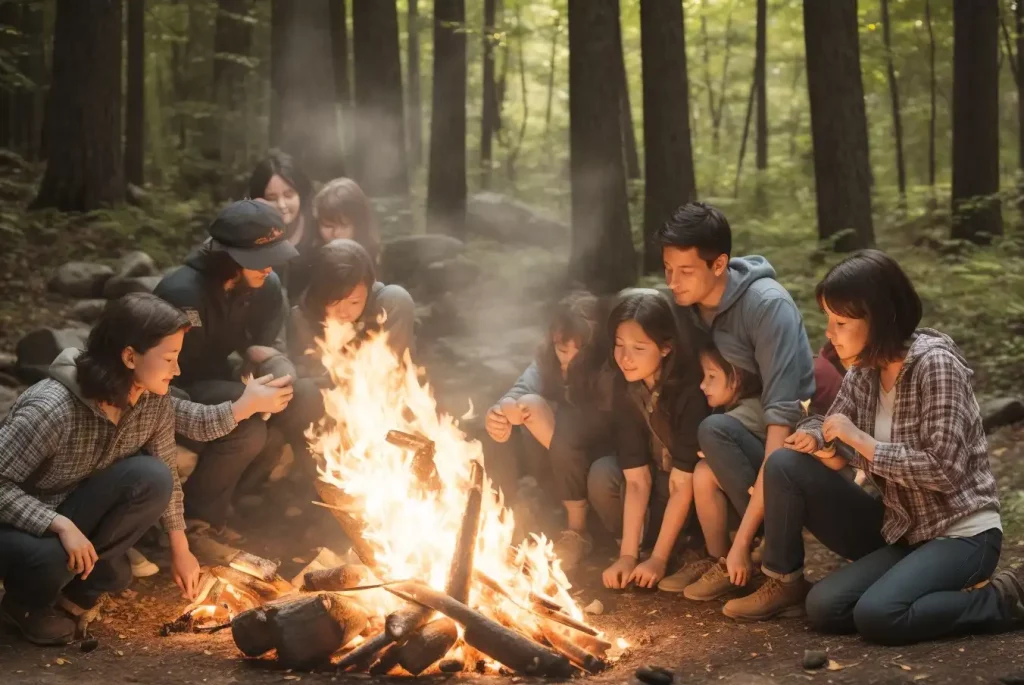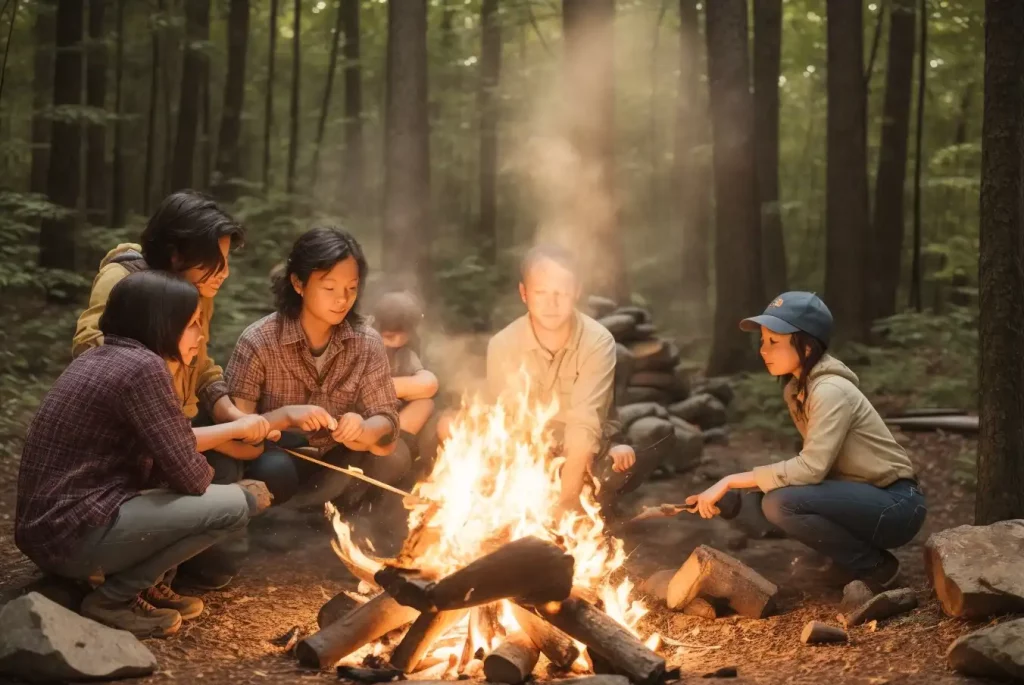Hey there, fellow outdoor enthusiasts! Are you passionate about campfire cooking like me?
If yes, you’ve probably had your share of memorable outdoor meals.
But here’s something to chew on—have you considered the impact of your camping utensils on Mother Earth?
Yep, that’s what we’re diving into today!
We’ll talk about why your traditional camping utensils might not be the best choice.
And, of course, we’ll explore some eco-friendly alternatives that are both awesome and responsible.
The Problem with Traditional Camping Utensils
Before we delve into the nitty-gritty, let’s take a moment to reflect on what we’re using to eat those s’mores and grilled fish.
You might think a spork is just a spork, but there’s more to it than meets the eye.
Environmental Impacts
Let’s start with those plastic utensils that seemed so convenient for your last camping trip.
Easy to carry, sure, but they end up contributing to the colossal plastic waste problem.
Even utensils that claim to be “disposable” often take years to decompose.
Remember that plastic fork you used last summer? Chances are, it’s still lingering in a landfill somewhere.
And how about those aluminum utensils?
You might think they’re better since metal sounds more eco-friendly than plastic.
But the energy-intensive production process for aluminum contributes to greenhouse gas emissions.
Plus, mining for aluminum ore leads to deforestation and habitat destruction.

Health Risks
Now, let’s talk about you—your health should be a top priority too, right?
Most traditional utensils, especially plastic ones, are made with harmful chemicals like BPA or phthalates.
And let me tell you, those chemicals leaching into your food? Not a delicious ingredient.
Even aluminum utensils aren’t as innocent as they seem.
Aluminum can react with acidic foods, causing the metal to leach into what you’re eating.
That’s a health no-no, especially if you’re cooking up something tangy like a tomato-based stew.
Alright, I know that’s a lot to take in. But don’t worry; we’re about to get to the good stuff.
Learn more: Which Utensils Are Best for Campfire Cooking
Categories of Eco-Friendly Utensils
So, you’re pumped to make a change but not sure where to start? No worries!
There’s a variety of eco-friendly utensils out there to make your outdoor cooking not just fun, but also Earth-loving.
Let’s delve into four major categories that’ll make you a pro in sustainable campfire dining.
Biodegradable Utensils
First up, the heroes of single-use: biodegradable utensils!
These bad boys are made from materials like cornstarch, sugarcane, and even bamboo.
Take BambooWare, for instance; their utensils are crafted from bamboo and break down naturally once you’re done with them.
So, you enjoy your BBQ, and the Earth doesn’t have to deal with another plastic fork sticking around for centuries.
It’s like giving Mother Earth a mini-break!
Recycled and Upcycled Utensils
Ever heard of turning trash into treasure?
That’s basically the mantra for recycled and upcycled utensils.
Brands like Preserve make utensils from recycled yogurt cups.
Yep, you read that right. Your morning yogurt could end up as your camping spoon!
Or, get crafty and make your own utensils from scrap metal or plastic—upcycling at its best.
Imagine the campfire stories you can tell about that fork you’re using!
Locally-Sourced Utensils
Now, let’s take it a notch closer to home.
Locally-sourced utensils minimize the carbon footprint caused by transportation.
If you’re camping in a wooded area, you can often find artisans who craft utensils from local wood.
Not only are you supporting local businesses, but you’re also cutting down on emissions.
The next time you’re planning a trip, why not hit up the local market first?
Reusable Utensils
Last but definitely not least, we’ve got the MVPs of sustainability—reusable utensils.
Companies like To-Go Ware offer utensil sets made from stainless steel, complete with a handy travel case.
The idea is simple: buy once, use forever (or at least a really, really long time).
These utensils won’t react with your food, and they’re easy to clean.
Talk about a win-win!
There you have it, four fantastic options to up your eco-friendly game the next time you’re huddled around a campfire. Can’t wait to tell you even more ways to make your outdoor experiences both awesome and environmentally friendly. So, what’s the next burning question on your mind?
Comparing Eco-Friendly Alternatives
So you’re sold on the idea of eco-friendly utensils, but how do they stack up against the traditional ones?
We’ll dive into cost, durability, and where you can snag these earth-friendly options.
Let’s crack the nuts and bolts of making the green switch.
Cost-Effectiveness
Alright, the million-dollar question—how much is this gonna cost me?
Biodegradable utensils are generally cheaper upfront but you’ll be buying them more often.
Recycled or upcycled options can be cost-comparable to traditional plastic utensils.
On the flip side, reusable and locally-sourced options may come with a higher initial price tag.
But here’s the kicker: they last a long time, which means you’ll actually be saving in the long run.
So, think of it as an investment, not just for your pocket but also for the planet.
Durability and Longevity
Durability is a biggie, especially if you’re roughing it in the wild.
Your average plastic fork might snap in the middle of skewering a marshmallow, and who wants that, right?
Biodegradable options are good for single-use but don’t expect them to last a week of heavy-duty camping.
Recycled and upcycled options are generally as sturdy as their plastic counterparts.
But if you’re looking for the marathon runners of utensils, go for the reusable or locally-sourced ones.
They’ll stick around for many a campfire tale, making them the Tom Hanks of the utensil world.
Accessibility
So where can you snag these eco-warrior utensils?
You’ll find biodegradable options at most big-box stores nowadays.
For recycled and upcycled options, online eco-shops are your best bet.
Locally-sourced utensils? Check out farmers’ markets or local artisans, and you might find just what you’re looking for.
And reusable ones are pretty much everywhere—online, in stores, and maybe even at your grandma’s house (you know she’s always ahead of the curve).
In this digital age, you’re just a few clicks away from making an eco-conscious choice.
Alright, folks, that’s the lowdown on how eco-friendly utensils compare with the regular ones you’ve been using. Are you ready to make the switch? Or still have some burning questions? Fire away!
How to Make the Switch
Ready to dip your toes in the eco-friendly waters but not sure where to start?
Don’t sweat it; the transition doesn’t have to be an “all or nothing” ordeal.
From practical advice to where you can start shopping, we’ve got you covered.
Tips for a Smooth Transition
First off, don’t throw out your old utensils just yet.
Keep ’em for emergencies or pass them along to someone who can use them.
Next, when you go shopping, start small—maybe pick up a set of biodegradable spoons or forks.
Don’t feel like you have to change everything overnight.
Incorporate them into your camping gear gradually.
Remember, every little bit helps.
And don’t forget to let your camping buddies in on your eco-journey; who knows, they might want to join you.
Where to Buy
So you’re sold and wanna know where to shop, huh?
For biodegradable options, your local supermarket is a good place to start.
Online platforms like Amazon also offer a range of eco-friendly utensils.
For something more unique, like recycled or upcycled stuff, Etsy is a goldmine.
And don’t underestimate local outdoor stores; they often carry local and sustainable brands.
Myths and Misconceptions
Alright, let’s bust some myths here.
Myth 1: “Eco-friendly utensils aren’t durable.” C’mon, have you even tried them?
2: “They’re way too expensive.” Well, think long-term and it makes cents—pun intended.
3: “It’s hard to find them.” Nope, not in the digital age, buddy.
Armed with the facts, you’re now ready to debunk any eco-skeptics in your circle.
Conclusion
So there you have it, folks.
Switching to eco-friendly utensils isn’t some colossal undertaking.
It’s as simple as making thoughtful choices, one meal at a time.
And the best part? You’re doing good for Mother Earth while enjoying your campfire-cooked meals.
So, what’s holding you back?
Make the switch; you won’t regret it!
And that’s the end of our eco-journey today. Ready to make a change? The ball’s in your court!


